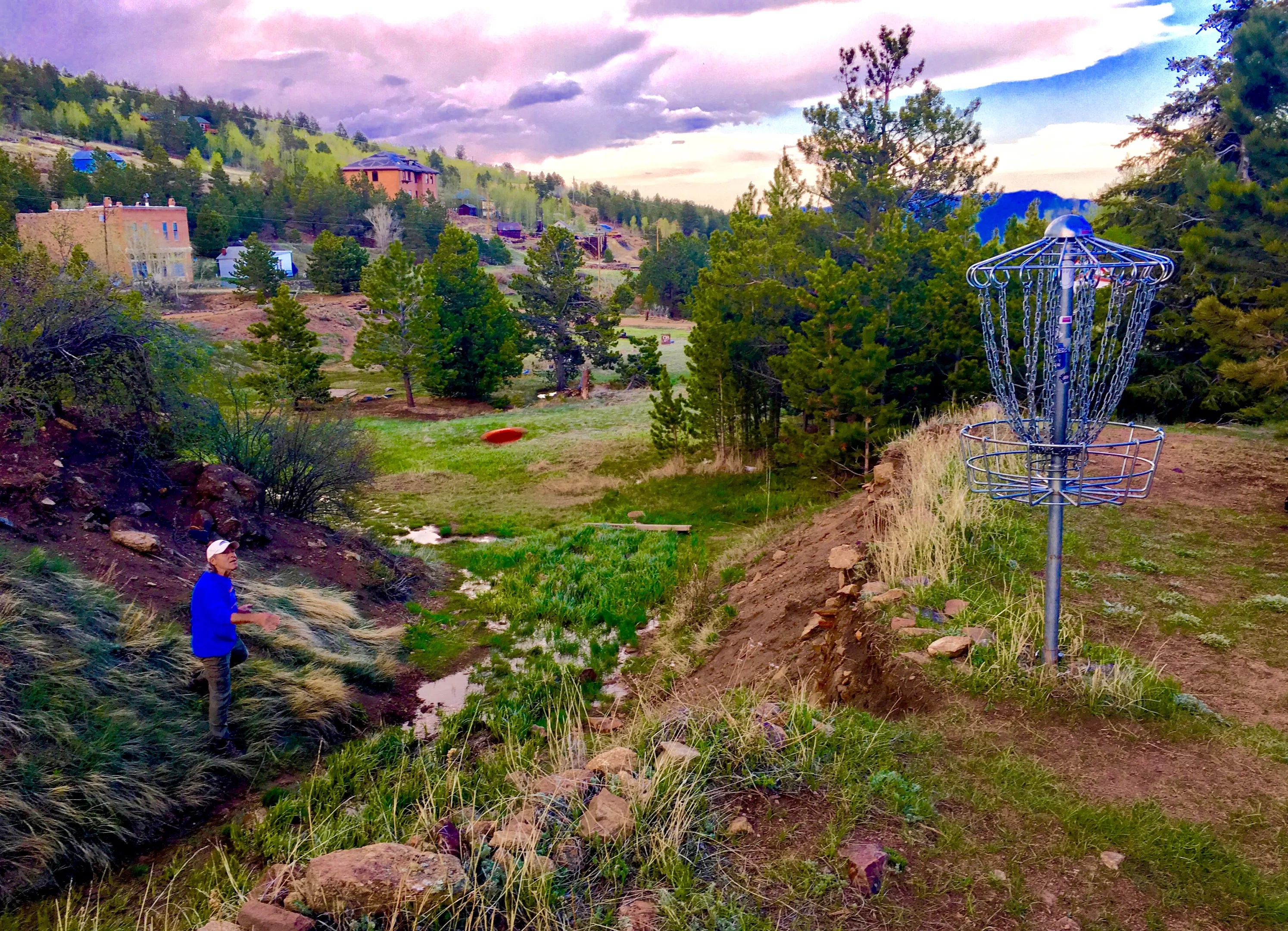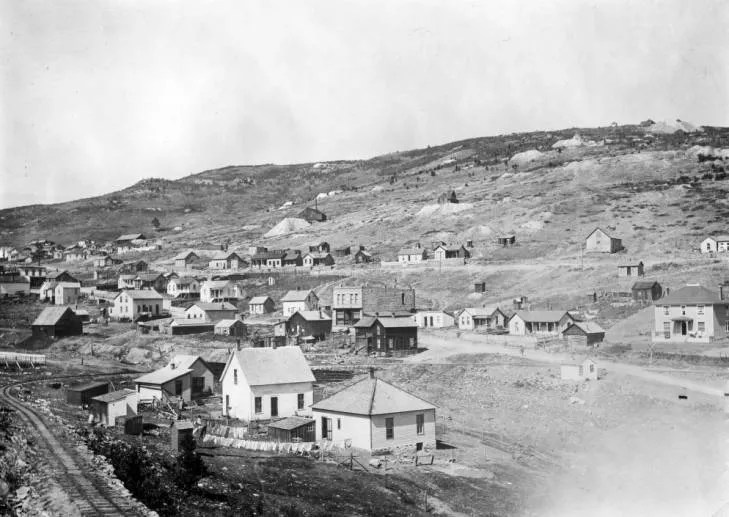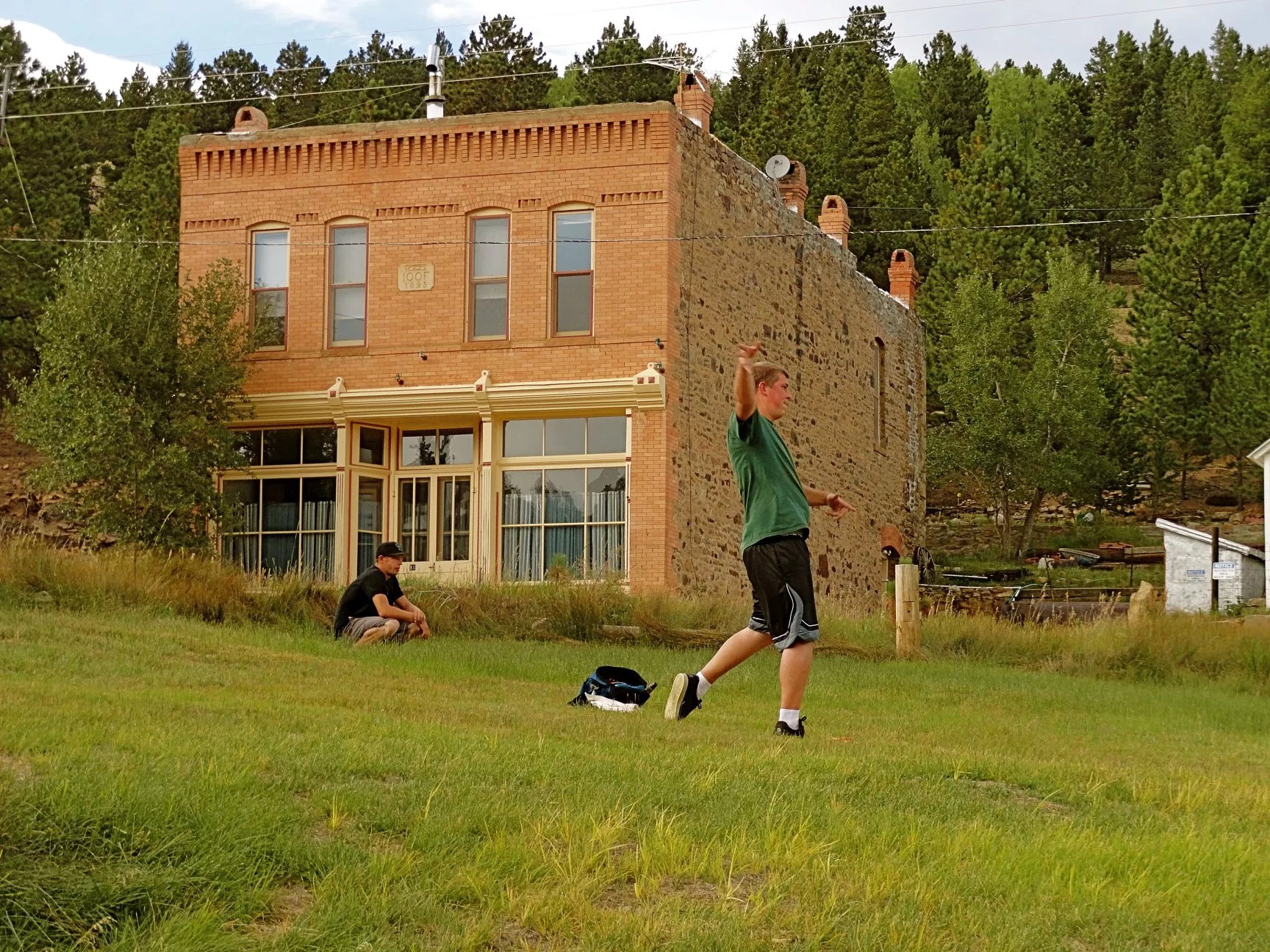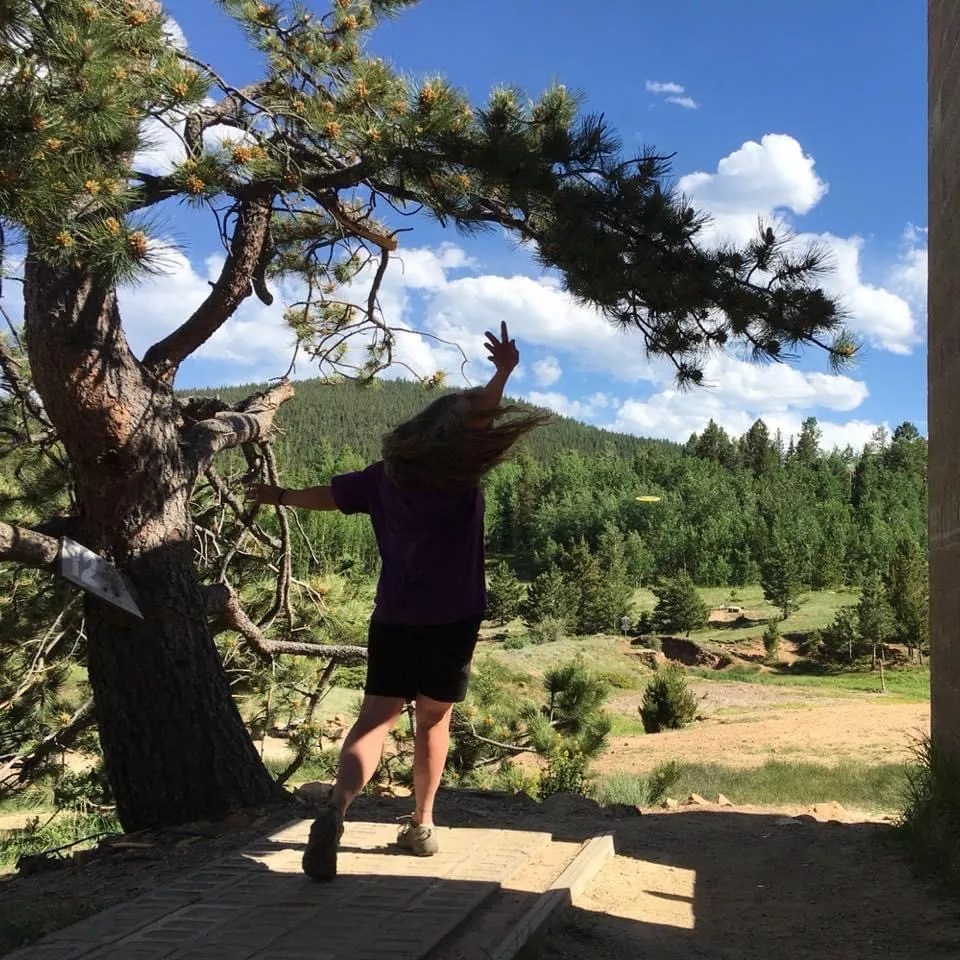
Courtesy of Ghost Town Disc Golf

Audio By Carbonatix
Brian and Bethany O’Donnell were pursuing one obsession (the band Donna the Buffalo) when it collided with another obsession (owning acreage in Colorado), which then allowed them to create the perfect setup for their main obsession (disc golf).
“Well, hmm, I don’t know about obsession,'” Brian says, chatting from his lightly haunted Ghost Town Disc Golf at Russell Gulch, which is indeed a ghost town in Gilpin County where he and Bethany bought property in 1999 and opened a public disc golf operation in 2003. “Let’s just say that we’ve been lucky enough to create a lifestyle around this unending labor of love.”
Ghost Town Disc Golf (aka GTDG) is one of about three dozen pay-to-play disc golf courses in a state that has nearly 300 free courses – about a third of which are located in the mountains, according to the Professional Disc Golf Association. It also happens to be the O’Donnells’ home, eighteen acres that host a handful of mining town-era buildings in various stages of ruination, all tucked into the craggy, steep terrain straddling Russell Gulch at 9,150 feet, less than ten minutes from Idaho Springs to the south (along the infamous Oh My God Road), and even closer to Central City and Black Hawk to the north.
The remote location and sprawling terrain make GTDG a natural destination for social distancing – after all, no one wants to get hit in the head with a flying plastic dessert plate, even if it does have the course’s Grateful Dead Steal Your Face-style skull logo on it – in a part of the state that’s not very populated to begin with. For disc golfers, as well as those intrigued by the history of one of Colorado’s once-thriving gold-mining towns, the steep, hilly hike required to navigate all twenty holes offers a solid workout through stands of lodgepole pine and aspens and across expansive meadows, with Pewabic Mountain as a backdrop.
Russell Gulch essentially became a suburb of Idaho Sprin

Russell Gulch was once a Gilpin County boomtown.
Denver Public Library
gs in 1859, when prospector William Greeneberry Russell discovered gold. The town eventually grew to about 2,600, and the usual buildings popped up in support: houses, barns, a school, a blacksmith, an Independent Order of Odd Fellows lodge, and several mills, including one owned by George Pullman. About a hundred crumbling buildings remain in the town, which now counts just a few resident families.
Like so many of Colorado’s ghost towns – several hundred of which still have enough remnants to draw regular visitors – Russell Gulch held on as best it could after the gold rush stopped panning out, but by the early 1900s, it housed fewer than a hundred people, among them Marion Lewis, whose family had purchased what is now the O’Donnells’ property in 1905. Lewis was born there in 1910, and she died there, too, after a long life that included teaching at the schoolhouse that still sits up the road.
Brian, who is originally from New Jersey, moved to Gilpin County in 1972, when he was 22, and just three years later discovered the joys of flinging a disc for the first time, after taking an adult continuing education class at Nederland High School from the then-reigning Women’s Freestyle Frisbee champion. “It cost $20,” he remembers, “and on the last night, she said, ‘Let’s go outside and I’ll show you Frisbee golf,’ which was basically just tossing it toward targets like trees and keeping track of your strokes.”
He was so intrigued by the experience that the next day, he and a buddy went into a nearby national forest and built a rudimentary course in the trees, eventually placing statues as targets and creating obstacles crafted from spare lumber and other found objects. “To this day, it’s still the course in Nederland,” Brian says.
In the early ’70s, “Steady” Ed Headrick had created the much smaller disc version of his patented Wham-O Pro Model Frisbee. In 1976, he trademarked the words “disc golf,” and he patented the Disc Pole Hole, too – that circular metal shelf on a pole topped by hanging chains to catch the disc, which is now known simply as “the basket.”
By then, Brian was officially hooked, and he spent the next fifteen years honing his throwing skills, even as he moved to Sullivan’s Island, South Carolina, in 1982. Although he is a commercial filmmaker by trade, he helped design and set up one of the very first disc golf courses in South Carolina, in North Charleston.
Charleston is where he met Bethany, who had moved there from Fort Wayne, Indiana – and she turned out to be a woman who loves to grip and rip in her free time even more than Brian does. “Beth is one of the best women disc golfers out there, and she beats me almost every time,” says Brian. “She’s at the top of her game right now.”
Since the couple knew that disc golf would be a big part of their lives, they became obsessed with finding a place for a personal course on their own land. But they were also obsessed with Donna the Buffalo, their favorite bluegrass/folk rock/zydeco band, and in 1999, they followed the group’s cross-country tour, which culminated in Colorado. “We had just sold our house in South Carolina and put everything in storage, and we had a big, old hippie van,” Brian explains. “I really just wanted to show Beth where I had lived in Colorado decades ago, but we wound up thinking how wonderful it would be to have a nice, big place here where we could put in our own course.”

The O’Donnells found a home in a ghost town.
Ghost Town Disc Golf Facebook
They looked at one property that was out of their price range, and then their realtor told them of this property that had been on the market for two years, ever since Marion Lewis had passed of a heart attack in the main house while washing her hair in the sink.
“The property was in really bad condition,” Brian remembers, “but we instantly saw the potential.” They immediately installed targets, with no intention of playing the course with anyone but friends and family. Bethany worked at casinos and Brian worked at Loveland Ski Area, and it didn’t occur to them that they could make a living by opening the course to the public.
That changed in 2003, when they took a trip to visit family in Brunswick, Maine, and encountered their first disc golf course that charged money. “I was like, wow, people are actually paying to play this sport,” Brian recalls. “You could play disc golf for free at parks all over the country, but on a Friday afternoon, people were pouring into this place to pay for a round. So I told Beth, ‘When we get back to Colorado, we’re going to open up a pay-to-play course in Russell Gulch.'”
That’s exactly what they did – but disc golf had yet to really catch on in Colorado. “I’d say it was 2006 and 2007 when there was suddenly this huge surge of interest,” Brian says. “Communities started putting them in for free in parks all over the state then, and it’s like that saying: ‘If you build it, they will come.’ Because all of a sudden, they started coming.”

Bethany O’Donnell shows off her grip-and-rip style.
Courtesy of Ghost Town Disc Golf
Russell Gulch once again boomed, and the O’Donnells not only had to start turning people away, but they had to cut back on their own playing, which had been daily. “We still throw on #18 and #19 at the end of every day, because it’s right outside our door,” Bethany says. “But getting in a whole round is a challenge, because there are always people out there now.”
The golfers come here to test their skills in a unique setting dotted with ruins, falling-down fencing and rusty old cars on a course that has more than its fair share of OBs – out-of-bounds penalties – because of the mining claims that border the fairways. GTDG is technical, with dry-pond hazards and a few mandos in the trees (mandatory designations where the disc has to pass on the correct side of marked zones), and the ruins carry penalty points for direct hits. Spectators might include a flock of grazing wild turkeys and a free-range barn cat as golfers wade through knee-high native grasses, trying hard not to take the extra point for hitting blacksmith Jimmy Shoelou’s circa-1875 hay barn.
Of course, in addition to disc golfers, GTDG also attracts those who simply want to check out the ghost town, but the O’Donnells eventually had to restrict the looky-loos to those arriving with a disc golf group, for a $5 fee. “We struggled with that, because we know that there are people who are just as into ghost towns as disc golf,” Brian says. “But it’s just like if you went to what we call a ‘white ball golf course’ and said, ‘We just want to walk around the greens today.’ I mean, they would say there was no way, right?”
Even more might try to visit if they knew the ghost town is haunted. “I’m not a believer,” Brian says. “I don’t get spooked. But we’ve had three experiences up here that were downright chilling.”
The first happened a decade ago, at the main house where Marion died. “We’d been in the house for about ten years at that point,” Brian says. “One day in the kitchen, it just all of a sudden had this maggoty smell of death. Like something had died in the wall, and honestly, it kept occurring to me that it smelled like a rotting old woman.” He and Bethany pulled the appliances, tore the cabinets and walls apart and poured bleach down the drain, all to no avail. “It was so weird, because it would be really strong sometimes, and then it would be very faint.”

The course travels through the old ghost town.
Ghost Town Disc Golf Facebook
One day the couple returned from a shopping trip to an overwhelming stench, and Brian had had enough. “I yelled to Beth, who was in another room, that I thought a spirit had taken up residence in our house. And I remembered the movie The Exorcist, where the priest orders the ghost out, and so in a firm voice, I just said, ‘Spirit, you are not welcome here.'”
Just as he finished the sentence, the bridge of his otherwise intact nose spontaneously broke open and started bleeding. “This wasn’t coming from my nostrils, you understand. I put my hand up and it was drenched in blood, and there’s blood pouring down onto my shirt. It was like my skin just ripped apart, but I didn’t feel it at all,” he recalls. And at that very instant, the smell was gone – never to return.
The other two experiences happened in the clubhouse more recently, and while they were less violent, they were no less dramatic – though Brian and Bethany say they never felt scared. “Twice we’ve gone to the clubhouse and found that all of the doors, everything, had been locked from the inside,” says Brian. “We literally had to take the doors off to get into the building, because there were no keyholes on the outside.”
Starting in July, guests can spend even more time exploring Russell Gulch when they stay overnight in an 1895 cottage that the couple renovated and will offer as a “Bed and Basket,” which they hope will entice more people to check out the sport.
“Disc golf is a game of the people,” Brian says. “You can get into it for about $20 worth of gear, and everyone is welcome. It’s just such a good time. I don’t know too many people who have tried it and didn’t get hooked.”
Now if they could just get Donna the Buffalo to come play the course.
Ghost Town Disc Golf is located at 190 Russell Gulch Road; the course is open from 8:30 a.m. to 5:30 p.m. daily. Fees are $10 per round Memorial Day to Labor Day, and $5 per round fall, winter and spring. On weekends, reservations are essential. To make one or to learn more about Bed and Basket deals, call 303-582-3083; find out more on the course’s Facebook page.